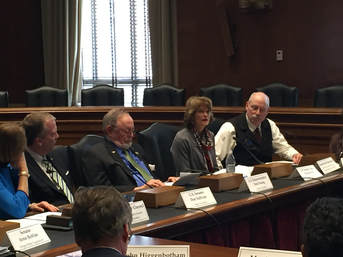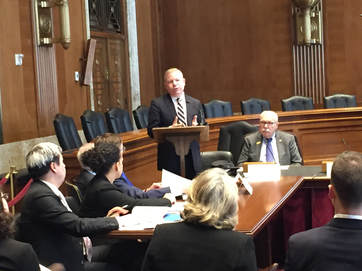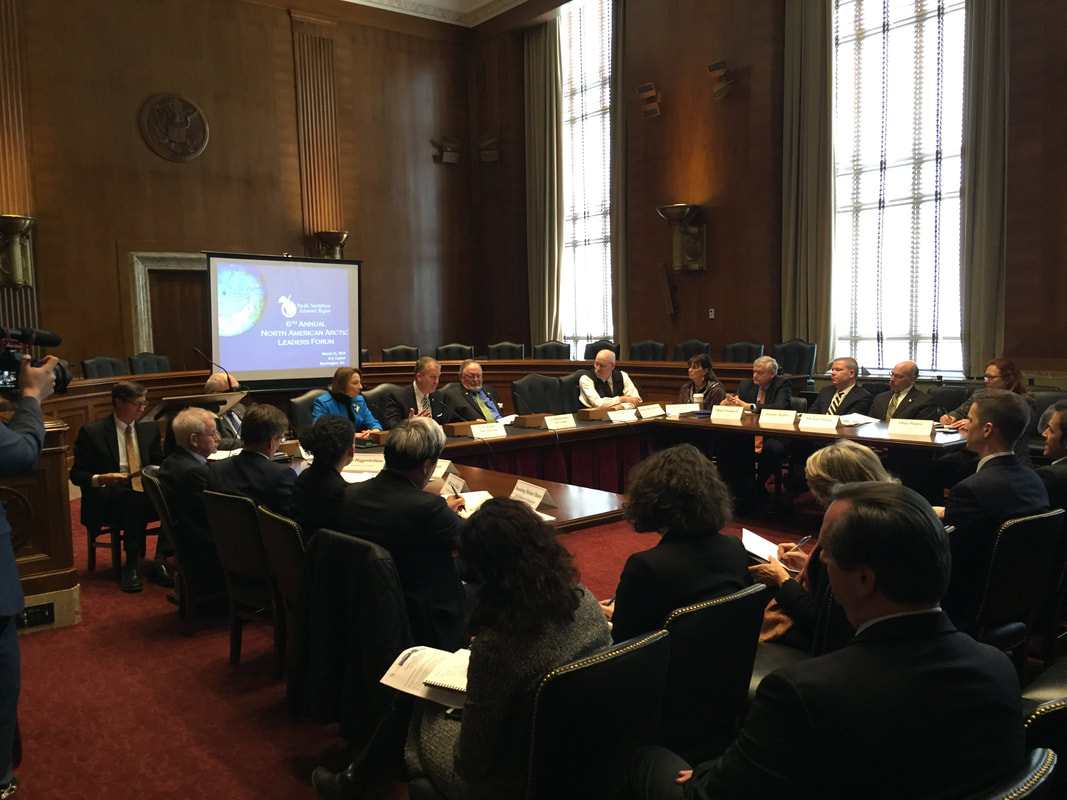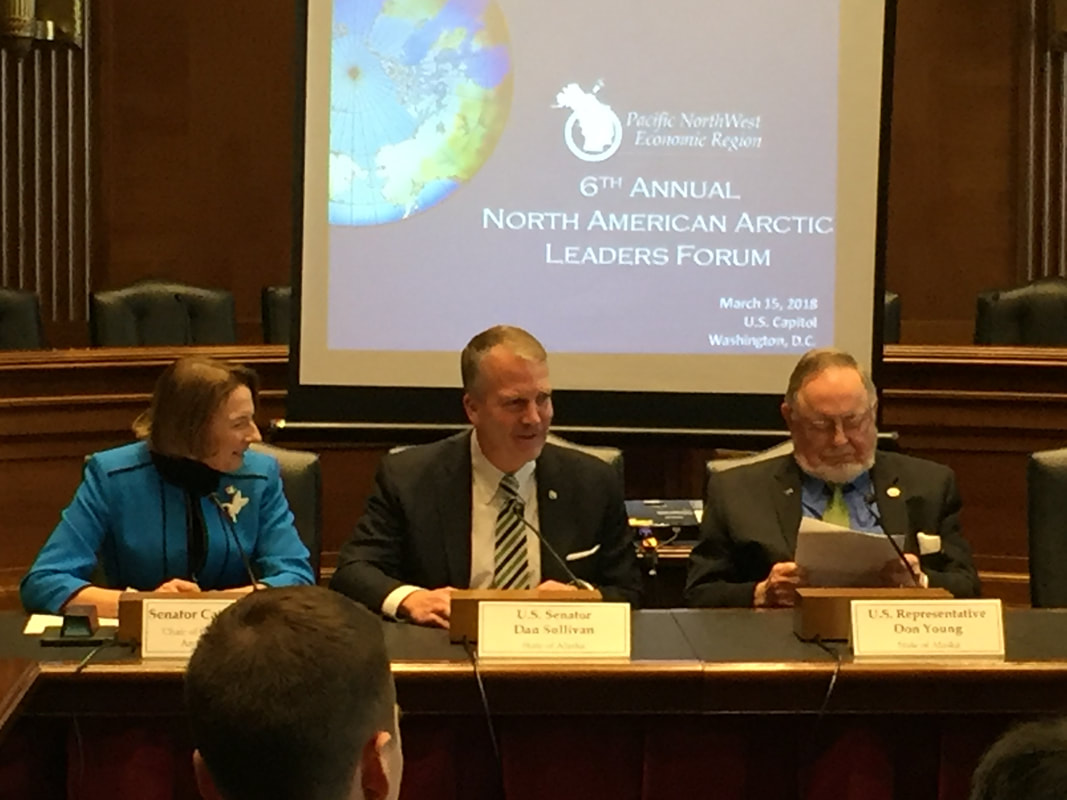Alaska Congressional Delegations headlines PNWER's North American Arctic Leaders Roundtable3/23/2018
 State Senator Bert Stedman (from the right to left) Senator Lisa Murkowski, rep. Don Young, Senator Dan Sullivan and State Senator Cathy Giessel. State Senator Bert Stedman (from the right to left) Senator Lisa Murkowski, rep. Don Young, Senator Dan Sullivan and State Senator Cathy Giessel. Senator Lisa Murkowski spoke about the need to have more administrative officials understand the importance of the arctic. It cannot be the sole responsibility of Alaska officials; U.S. officials need to be educated on and advocate for arctic policies, especially policies that will endure past the current Presidential Administration. Almost all U.S. agencies have a role to play in the arctic and they need to breakdown internal silos and be more collaborative with one another. It is challenging to work with each individual agency with various arctic initiatives. Additionally, the Arctic Circle will highlight Alaska at its annual meeting in Iceland, as well as the importance of shipping in the arctic and sharing icebreaker infrastructure in North America. Rep. Don Young spoke to the challenges of working with the federal government and the need for more collaboration with the State of Alaska. He emphasized the importance of working with the International Maritime Organization (IMO) on a system for transiting the Arctic in North America. Transportation infrastructure and arctic policy with regional leaders through roundtables and consultationTransportation infrastructure and arctic policy with regional leaders through roundtables and consultation. Issues were raised during the panel discussions and roundtable of bilateral concern. Oil and gas development in Alaska could pose a threat to the porcupine caribou herd that migrates across the region. According to U.S. officials, there are vacancies on the International Porcupine Caribou Board, a body established by a bilateral agreement to address issues with the herd. Moreover, sufficient oil spill response equipment is another area in need of transboundary attention. Representatives from Canada emphasized the systemic nature of the Arctic, and any environmental disaster will not be confined to its source. Communication BarriersJohn Higginbotham, Centre for International Governance Innovation (CIGI) spoke about the need for the governments to work together especially on Arctic policy and the importance of the prime minister and president to work together on arctic issues. Adrianna Muir, Deputy Senior Arctic Official from the U.S. State Department spoke about the need for all levels of the federal government agencies to communicate across silos. This theme was mentioned during Senator Murkowski’s remarks on fixing communication barriers across the federal government. She also recognized Alaska’s role as a leader in the Arctic. Senator Stedman added that arctic communities want infrastructure and desire to see their communities share in the same technological advancements as other U.S. cities. Arctic Shipping Speaker: Jeremy Mathis from the National Oceanic and Atmospheric Administration. Speaker: Jeremy Mathis from the National Oceanic and Atmospheric Administration. Shipping infrastructure is critical to the economic viability of the Arctic, and may also present the best business plan for the region. An Arctic Seaway that guarantees port access, icebreaking services, and search and rescue capabilities could reduce liability for international transport companies. The plan’s user fee model could recoup infrastructure construction and operating costs as shipping traffic is expected to increase in the Arctic. Mike Sfraga from Wilson Center Polar Initiative, Mead Treadwell, PT Capital and Jeremy Mathis, National Oceanic and Atmospheric Administration spoke about the opportunities for arctic shipping in the region and outlined a couple innovative ideas on working together on transiting the region. An example of similar program conducted in the St. Lawrence Seaway was showcased as a possible solution for collecting fees for managing the northwest passage waterway. When a ship transits the waterway, the U.S. and Canada coordinate with each other throughout a ship’s transit. Some challenges exist as far as infrastructure and rules for ships traveling through the region. Additionally, Canada and the U.S. still have a dispute on sovereignty of the region and the national border. More work needs to be done in both countries to create a shared system for monitoring ships and collecting fees for managing the waterway. The Wilson Center is hosting a conference on Arctic port infrastructure later this summer. ConclusionThe event concluded by looking towards the future. In particular, the roundtable discussed the proposed Alaska LNG pipeline and potential Chinese investment in the project. China and Alaska have signed memorandum of understanding to develop the project with a percentage of the gas supply guaranteed for the Chinese market. The Roundtable was an exciting chance for arctic experts to share ideas and topics impacting the North American Arctic. ResourcesSteve Myers, Senior Program Manager, PNWER and Michael Mauer, M.A. Candidate, May 2018, International Economics & Conflict Management, Johns Hopkins School of Advanced International Studies (SAIS) contributed to this article.
TARIFFS: THE WRONG WAY TO ACHIEVE GREATER ECONOMIC GROWTH, RESILIENCE, AND SECURITY IN NORTH AMERICA3/7/2018
PNWER Statement on Steel and Aluminum Tariffs
March 7, 2018 TARIFFS – THE WRONG WAY TO ACHIEVE GREATER ECONOMIC GROWTH, RESILIENCE, AND SECURITY IN NORTH AMERICA The highly integrated North American steel and aluminum industry supports critical manufacturing supply chains in both the US and Canada. Because of our interdependent economic ties, the proposed 25% steel and 10% aluminum tariffs will have unintended consequences which will seriously impact jobs and local economies in the US and Canada. If tariffs are imposed they most likely will lead to higher prices for consumers in the US and in Canada which will limit economic growth. Canada buys more American steel than any other country and accounts for 50% of U.S. exports. The U.S. has a $2-billion surplus in steel trade with Canada, and US exports of aluminum to Canada support more than 160,000 US jobs. Should any tariffs be considered on steel and aluminum, Canada deserves an exemption due to our shared economics ties, supply chain integration and mutual defense partnership. Senator Arnie Roblan, (Oregon) PNWER President: “PNWER stands for the strong economic connection between our two countries. We have the longest open border in the world, and our trade policy should reflect that. The integrated supply chains that allow us to build world class airplanes depend upon stable, reliable, and open trade relationships with Canada that would be disrupted by any tariffs between us.” "Canada and the U.S. share a long history of economic and security cooperation that has created one of the world's most enduring and prosperous international partnerships. Exempting Canada from the proposed steel and aluminum tariffs is the right choice for both our countries. It would mean these highly integrated industries can continue providing the prosperity and security that support so many businesses and hundreds of thousands of jobs on both sides of the border,” said Graham Sucha, Member of the Legislative Assembly of Alberta, and PNWER Vice President. PNWER supports the modernization of NAFTA to enhance the existing economic relationships within PNWER jurisdictions in a mutually beneficial manner. PNWER Letter to President Donald J. Trump - March 7, 2018 More information about PNWER's trade advocacy here. *UPDATE: Trump's steel, aluminum tariffs exempt Canada, Mexico BIG NEWS in the trade world this week as President Trump announced his intention to implement tariffs on steel and aluminum, a threat that now hangs over NAFTA negotiations. Prime Minister Trudeau called the tariffs "unacceptable" and many in Canada and the U.S. are urging the U.S. administration to exempt Canada from any steel tariffs.
The seventh round of negotiations got underway earlier this week as representatives from the U.S., Canada. and Mexico convened in Mexico City for more talks. The latest news today is that negotiators have reached an agreement on regulatory best practices. The last round of talks, which took place in Montreal in January, was described by USTR Robert Lighthizer as a "step forward, but we are progressing very slowly". Click here for a quick summary of where each issue stands following the Montreal round. Here at PNWER, we have been closely tracking the progress of NAFTA. This week, a PNWER delegation, including CEO Matt Morrison, PNWER VP Rep. Mike Cuffe (MT), and Steve Myers, visited D.C. to speak with our Congressional offices and partners, including a meeting with Chief of Staff for Congressman Dave Reichert (R-WA) Chair of the International Subcommittee of Ways & Means, and the lead for NAFTA negotiations in the House. They also met with the US Dept. of Agriculture, US Department of Interior, and the State Department and discussed PNWER's NAFTA Resolution and Modernization Recommendations, as well as the upcoming Farm Bill and Country of Origin Labeling (COOL). In January, PNWER conducted our annual capital visits with President Arnie Roblan (OR) and had the the opportunity to meet and discuss NAFTA with our governors, legislative leaders, state commerce departments, and business stakeholders in Olympia, Boise, and Juneau. PNWER CEO Matt Morrison also had the opportunity to speak Feb 22 at the Greater Vancouver Board of Trade's Beyond NAFTA event. on the importance of the deeply integrated U.S.-Canada trade relationship. Catch up on everything you need to know for the seventh round of NAFTA talks: Attached is a handy reference sheet breaking down the costs to U.S. businesses, farmers, and key industries of withdrawing from NAFTA. NAFTA negotiations round 7 underway as Mexico-U.S. tensions flare Time crunch looms over seventh round of NAFTA talks The Real Game Trump is Playing on NAFTA A year later, NAFTA is still alive Study: Withdrawing from NAFTA will cost 1.8 million jobs in the first year In other news, the U.S. ambassador to Mexico Roberta Jacobsen has unexpectedly announced her retirement. . Finally, I'd like to once again point out the great resource that our friends at the Business Council of Canada have developed which demonstrates the dollar value of each U.S. state and individual Congressional district's exports to Canada. The annual value of U.S. exports to Canada is $321 billion, and $13.8 billion in the PNWER states alone. We encourage you to utilize this resource - http://thebusinesscouncil.ca/canada-us-partnership/ |
Archives
August 2023
Topics
All
|
|
World Trade Center West
2200 Alaskan Way, Suite 460 Seattle, WA 98121 |
|


